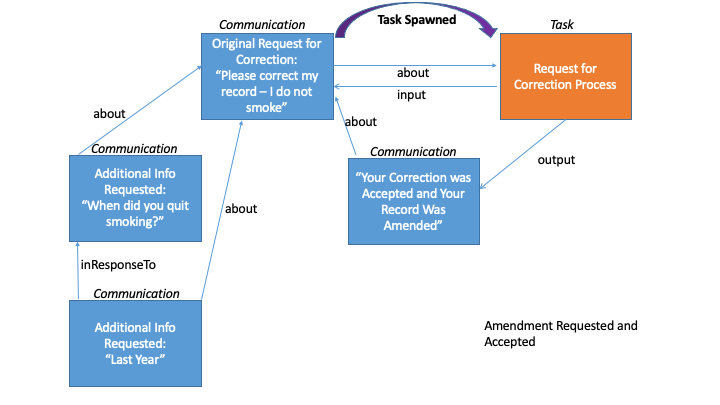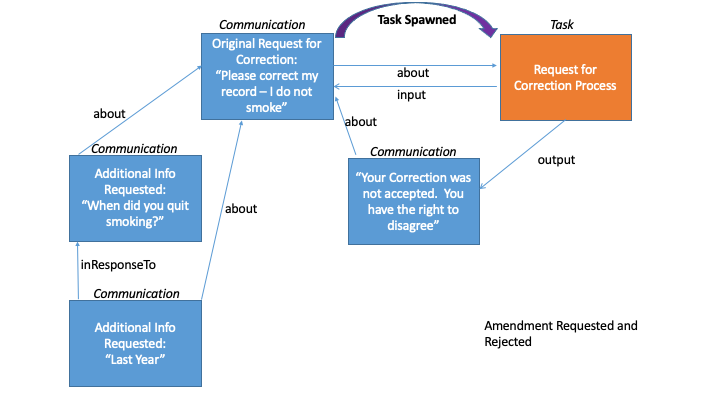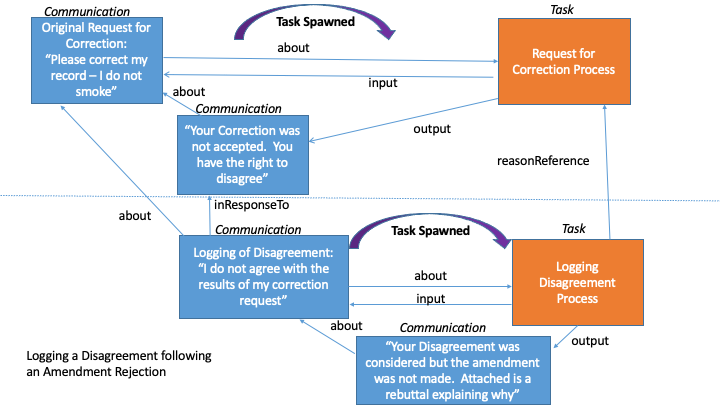This page is part of the Patient Request for Corrections Implementation Guide (v1.0.0-ballot: STU 1 Ballot 1) based on FHIR (HL7® FHIR® Standard) R4. The current version which supersedes this version is 1.0.0. For a full list of available versions, see the Directory of published versions
A patient request for correction is initiated by invoking the $correction-request operation. The input for the operation is a Patient Correction Bundle which includes a Patient Correction Communication resource that describes the specific request. The invocation of the operation on the fulfiller results in the posting of the Patient Correction Communication resource on the fulfiller. It is also expected to result in the creation of a Patient Correction Task resource which can be used to track the status of the request.
All Communications related to the correction request can be located by searching the about field for the original Communication.
The Communication recipient and sender fields are used to track whether each Communication is from the patient to the fulfiller, or vice versa.
Certain fields in Task and Communication provide important linkage information.
Communication about will be empty for the initial Communication when the $correction-request operation is made to the server. Communication about for the initial Communication will then be populated with a reference to the correction Task when the Task for the request is spawned as result of the operation.
All subsequent Communication resources will point to the initial Communication resource for the correction request in their Communication about fields.
The Communication recipient and sender fields are used to track whether each Communication is from the patient to the fulfiller, or vice versa.
Task input points to the Communication that contains the initial request details, and Task output points to the Communication that contains the final results (amendment or denial details).
The Task reasonReference field is used to link a Log Disagreement Task to the related Correction Request Task.
The following diagrams show the Communication and Task linkages.



The Task.status and Task.businessStatus are used to convey the the state of the patient correction.
| Task.status | Task.businessStatus (Code) | Task.businessStatus (Display) | Task.businessStatus Definition |
|---|---|---|---|
| ready | queued | Queued | A request to correct a record or log a disagreement has been received by the fulfiller (e.g. provider) but has not yet been reviewed. |
| in-progress | in-review | In Review | Review is in progress. |
| in-progress | waiting-for-information | Waiting for Information | The fulfiller (e.g. provider) is waiting for additional information. |
| cancelled | requester-cancelled | Cancelled | The request has been cancelled by the requester (e.g. patient). |
| in-progress | accepted | Accepted | Decision was made to accept the correction request. |
| in-progress | partial-accept | Partial Accept | Part of the correction request was accepted, and part was denied. |
| completed | amendment-completed | Amendment Completed | The record has been amended (corrected). |
| completed | denied | Denied | The request has been denied. |
| completed | disagreement-logged | Disagreement Logged | The fulfiller (e.g. provider) has logged the requester’s (e.g. patient’s) disagreement with the correction request denial. |
| completed | inform-rebuttal-option | Inform Rebuttal Option | The fulfiller (e.g. provider) has logged the requester’s (e.g. patient’s) disagreement with the correction request denial, and provided a formal rebuttal. |
Please note that statuses shown containing underscores in this diagram actually use hyphens instead. For example, “in_review” should be interpreted as “in-review”.
Must Support on any profile data element SHALL be interpreted as follows:
NOTE: The above definition of Must Support is derived from HL7v2 concept “Required but may be empty - RE” described in HL7v2 V28_CH02B_Conformance.doc. NOTE: Readers are advised to understand FHIR Terminology requirements, FHIR RESTful API based on the HTTP protocol, along with FHIR Data Types, FHIR Search and FHIR Resource formats before implementing US Core requirements.
The Patient Request for Corrections workflow is a bidirectional communication between a patient (or their proxy) and a fulfiller. Proper authentication is critical so that the communication is not exploited by malicious actors resulting in exposure of patient data. All transactions in the Patient Request for Corrections workflow must be secured appropriately with access to limited authorized individuals, data protected in transit, and appropriate audit measures taken.